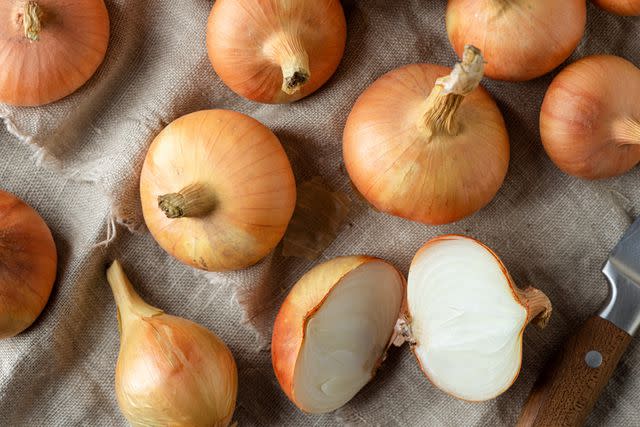Benefits of Making Onion the Star Ingredient
Onion-forward meals have a lot of nutritional value
Medically reviewed by Suzanne Fisher, MS, RD, LDN
Onions (Allium cepa) are a nutritious vegetable of the Allium genus, like garlic, chives, leeks, and shallots. They come in different varieties and provide many health benefits, such as antioxidants, protection against cancer, and immune system support. Including onions in your diet is a nutritious way to improve your overall health.
This article will provide an overview of the benefits of onions and their nutritious value and offer tips on selecting fresh, safe, and uncontaminated onions.

Arx0nt / Getty Images
Benefits: Why Are Onions Healthy?
Onions are considered to be a highly nutritious vegetable. They contain phytochemicals, compounds plants produce to ward off harmful bacteria, viruses, and fungi. Consuming these phytochemicals provides health benefits and gives onions the following properties:
Antioxidant
Antimicrobial
Anti-inflammatory
Anti-obesity
Antidiabetic
Anticancer
Protective to the cardiovascular, digestive, respiratory, reproductive, and neurological systems
Protective against liver disease
Supportive of a healthy immune system
Takeaway
Onions can be used as an herbal medicine to relieve asthma, bronchitis, and coughing.
Related: Superfoods That Lower Lung Cancer Risk
Forms and Varieties of Onions
Onions are part of the Allium plant genus, including plants like garlic, leeks, and chives. They vary in flavor and can be sweet, tangy, and sour. Different varieties combined with farming practices contribute to the flavor profile of onions.
There are many varieties of onions. The most common and widely available onions are red, yellow, Spanish (sweet), and white. Other onions include cipollini, pearl, and Vidalia.
What's Healthier, Raw or Cooked Onions?
Though onions are beneficial whether eaten raw or cooked, cooking onions reduces the number of thiosulfinates, compounds that give onions their antimicrobial, antifungal, and antibiotic properties. However, research shows that when onions are crushed before cooking, they retain their health benefits.
Of the various cooking methods, boiling and frying onions seem to cause the most significant loss in nutritious value. Other preparation methods that decrease health benefits include sautéing, steaming, and microwaving.
In contrast, baking onions is shown to increase their flavonoids in onions. Consuming dried, powdered onions can also offer nutritious value to food, especially if the powder is freeze-dried.
Takeaway
Onions can be incorporated into a diet in several ways, including cooking, pickling, consuming them raw on sandwiches and salads, turning them into juice, or using them as a spice.
Related: Why Chopping Onions Makes Us Cry
Onion Nutrition Facts
Onions are a highly nutritious food that can contribute to a healthy diet. Along with other related vegetables, like garlic, leeks, and shallots, onions contain flavonoids, glutathione, selenium compounds, vitamin E, and vitamin C, which contribute to the antioxidant properties of the vegetable.
Here is the nutrition information for a medium onion:
Total calories: 44
Total fat: 0 grams (g)
Cholesterol: 0 milligrams (mg)
Carbohydrates: 10 g
Dietary fiber: 2 g
Total sugars: 5 g
Protein: 1 g
Calcium: 2 mg
Sodium: 4 mg
Iron: 1 mg
Vitamin D: 0 micrograms (mcg)
Takeaway
Though research is variable, some studies show that eating onions can decrease certain cancers, especially those affecting the digestive tract.
Related: Signs and Symptoms of Stomach Cancer
How to Select Uncontaminated Onions
Though onions have many health benefits, they can contain pesticide residue, heavy metals, microbial contamination, and nitrate accumulation. Knowing where your onions come from can help ensure there wasn't incorrect use of pesticides or that the soil the onions were grown in was not enriched with heavy metals. When possible, purchase onions from reputable sources with transparent farming practices, such as at farmers markets.
Onions found in environments that have not been effectively sterilized run the risk of growing harmful bacteria. To avoid contamination of Escherichia. coli (E. coli), salmonella, and mold, it's safest to purchase whole onions and cut them at home rather than buying pre-chopped onions at the store.
When purchasing onions, select those that feel firm, have little to no bruises or discolored spots, and have dry skins. Avoid onions that show evidence of mold, such as white or black spots on the surface or inside the layers of the onion, and those with green shoots, which means the onion is still edible but won't last as long.
Summary
Onions are a nutritious vegetable that have antifungal, antibacterial, anti-inflammatory, and many other healthy properties. They provide health benefits regardless of how they are prepared, though onions lose some of their nutritional value when cooked. Part of what makes onions so healthy is that they contain flavonoids, glutathione, selenium compounds, vitamin E, and vitamin C.
The most common types of onions are red, white, yellow, and Spanish onions. When selecting onions, look for those that are without blemishes or discoloration, feel firm, and have dry, papery skins.
Read the original article on Verywell Health.

